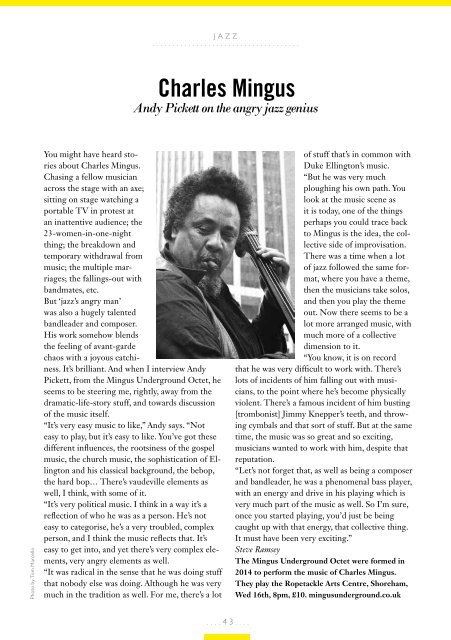Viva Brighton Issue #45 November 2016
Create successful ePaper yourself
Turn your PDF publications into a flip-book with our unique Google optimized e-Paper software.
JAZZ<br />
.....................................<br />
Charles Mingus<br />
Andy Pickett on the angry jazz genius<br />
Photo by Tom Marcello<br />
You might have heard stories<br />
about Charles Mingus.<br />
Chasing a fellow musician<br />
across the stage with an axe;<br />
sitting on stage watching a<br />
portable TV in protest at<br />
an inattentive audience; the<br />
23-women-in-one-night<br />
thing; the breakdown and<br />
temporary withdrawal from<br />
music; the multiple marriages;<br />
the fallings-out with<br />
bandmates, etc.<br />
But ‘jazz’s angry man’<br />
was also a hugely talented<br />
bandleader and composer.<br />
His work somehow blends<br />
the feeling of avant-garde<br />
chaos with a joyous catchiness.<br />
It’s brilliant. And when I interview Andy<br />
Pickett, from the Mingus Underground Octet, he<br />
seems to be steering me, rightly, away from the<br />
dramatic-life-story stuff, and towards discussion<br />
of the music itself.<br />
“It’s very easy music to like,” Andy says. “Not<br />
easy to play, but it’s easy to like. You’ve got these<br />
different influences, the rootsiness of the gospel<br />
music, the church music, the sophistication of Ellington<br />
and his classical background, the bebop,<br />
the hard bop… There’s vaudeville elements as<br />
well, I think, with some of it.<br />
“It’s very political music. I think in a way it’s a<br />
reflection of who he was as a person. He’s not<br />
easy to categorise, he’s a very troubled, complex<br />
person, and I think the music reflects that. It’s<br />
easy to get into, and yet there’s very complex elements,<br />
very angry elements as well.<br />
“It was radical in the sense that he was doing stuff<br />
that nobody else was doing. Although he was very<br />
much in the tradition as well. For me, there’s a lot<br />
of stuff that’s in common with<br />
Duke Ellington’s music.<br />
“But he was very much<br />
ploughing his own path. You<br />
look at the music scene as<br />
it is today, one of the things<br />
perhaps you could trace back<br />
to Mingus is the idea, the collective<br />
side of improvisation.<br />
There was a time when a lot<br />
of jazz followed the same format,<br />
where you have a theme,<br />
then the musicians take solos,<br />
and then you play the theme<br />
out. Now there seems to be a<br />
lot more arranged music, with<br />
much more of a collective<br />
dimension to it.<br />
“You know, it is on record<br />
that he was very difficult to work with. There’s<br />
lots of incidents of him falling out with musicians,<br />
to the point where he’s become physically<br />
violent. There’s a famous incident of him busting<br />
[trombonist] Jimmy Knepper’s teeth, and throwing<br />
cymbals and that sort of stuff. But at the same<br />
time, the music was so great and so exciting,<br />
musicians wanted to work with him, despite that<br />
reputation.<br />
“Let’s not forget that, as well as being a composer<br />
and bandleader, he was a phenomenal bass player,<br />
with an energy and drive in his playing which is<br />
very much part of the music as well. So I’m sure,<br />
once you started playing, you’d just be being<br />
caught up with that energy, that collective thing.<br />
It must have been very exciting.”<br />
Steve Ramsey<br />
The Mingus Underground Octet were formed in<br />
2014 to perform the music of Charles Mingus.<br />
They play the Ropetackle Arts Centre, Shoreham,<br />
Wed 16th, 8pm, £10. mingusunderground.co.uk<br />
....43....


















